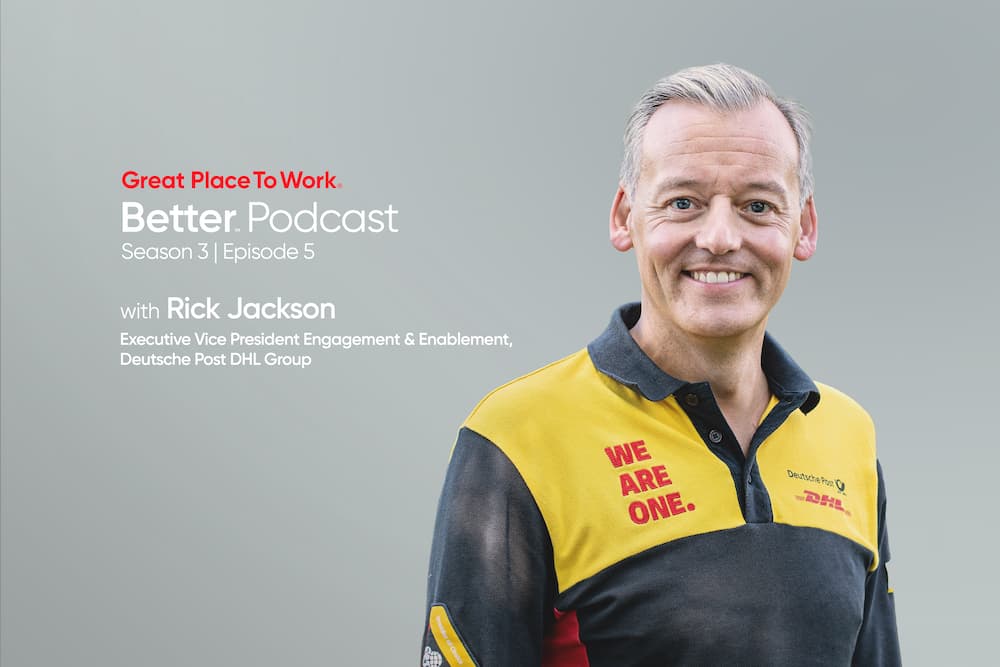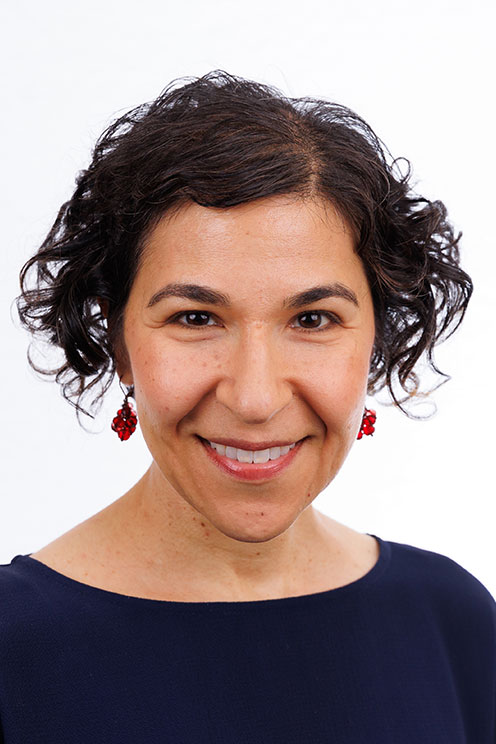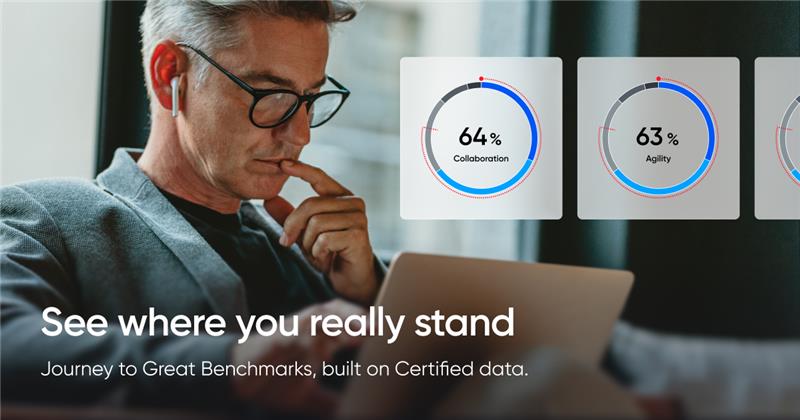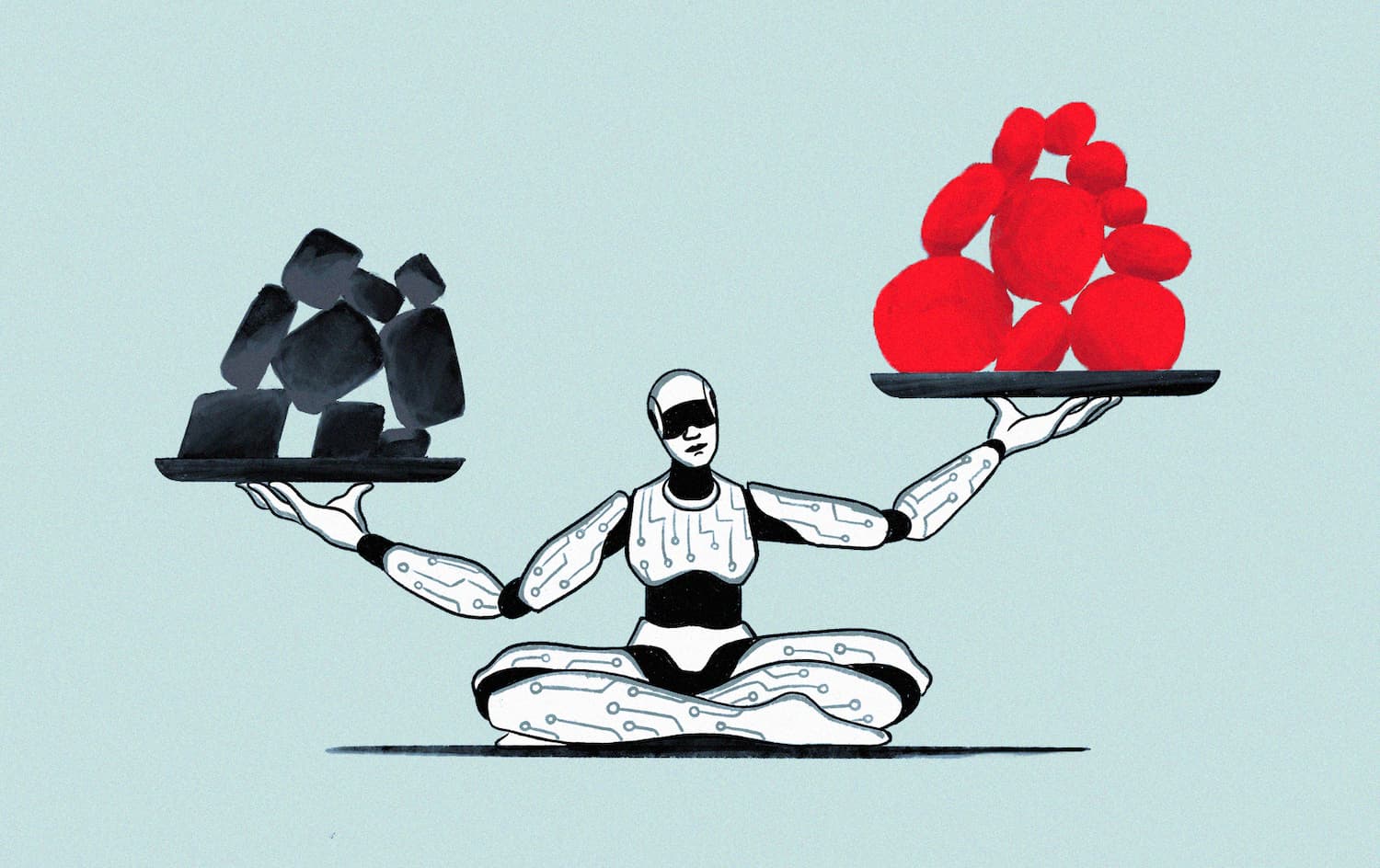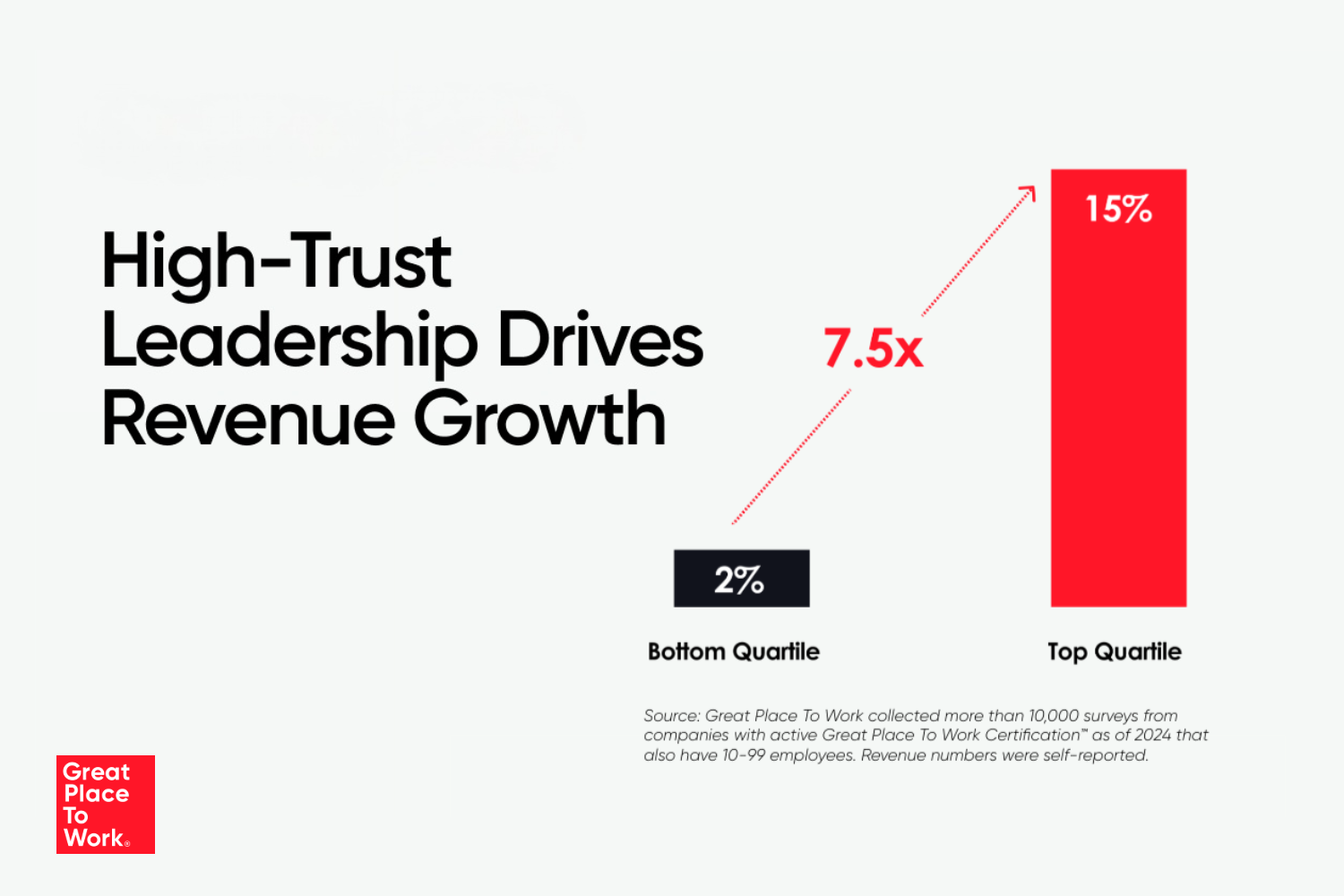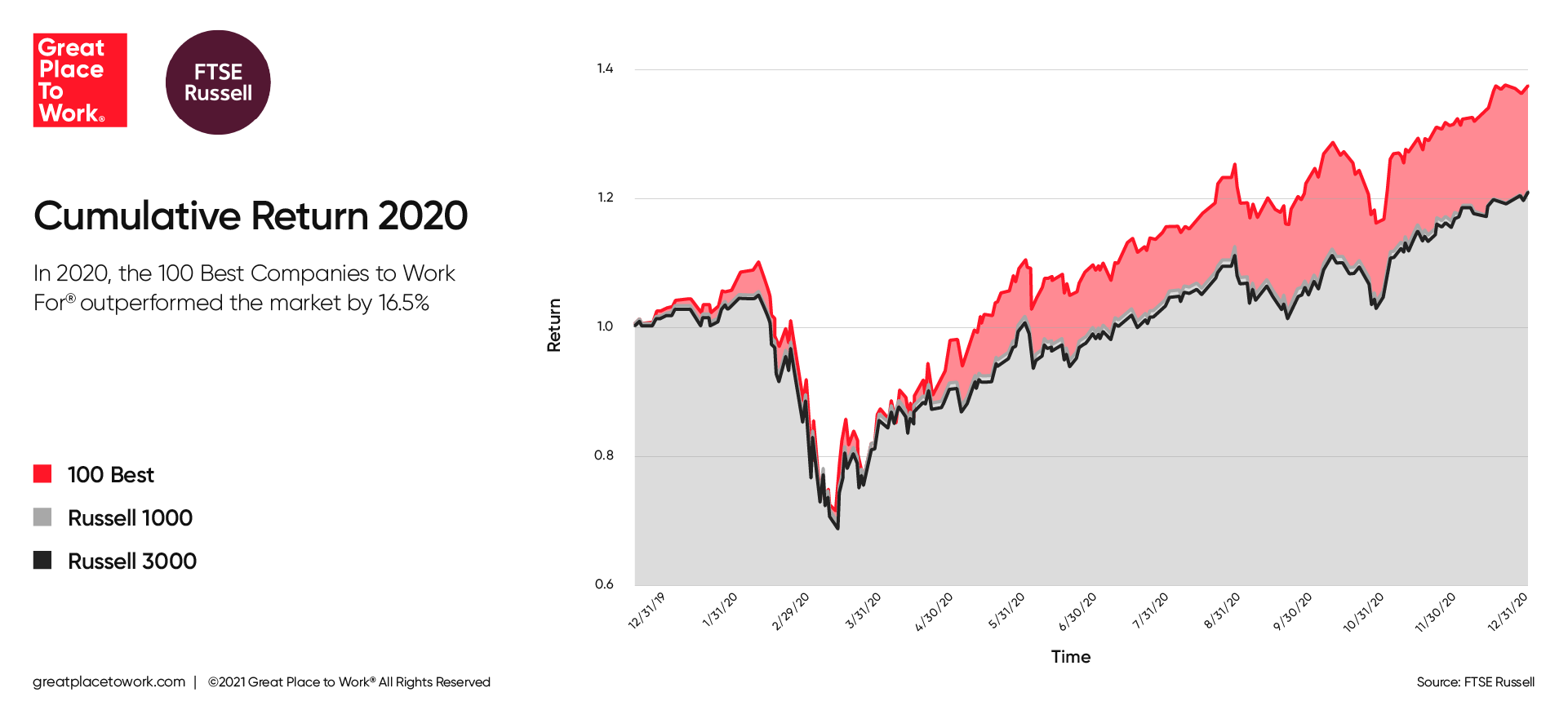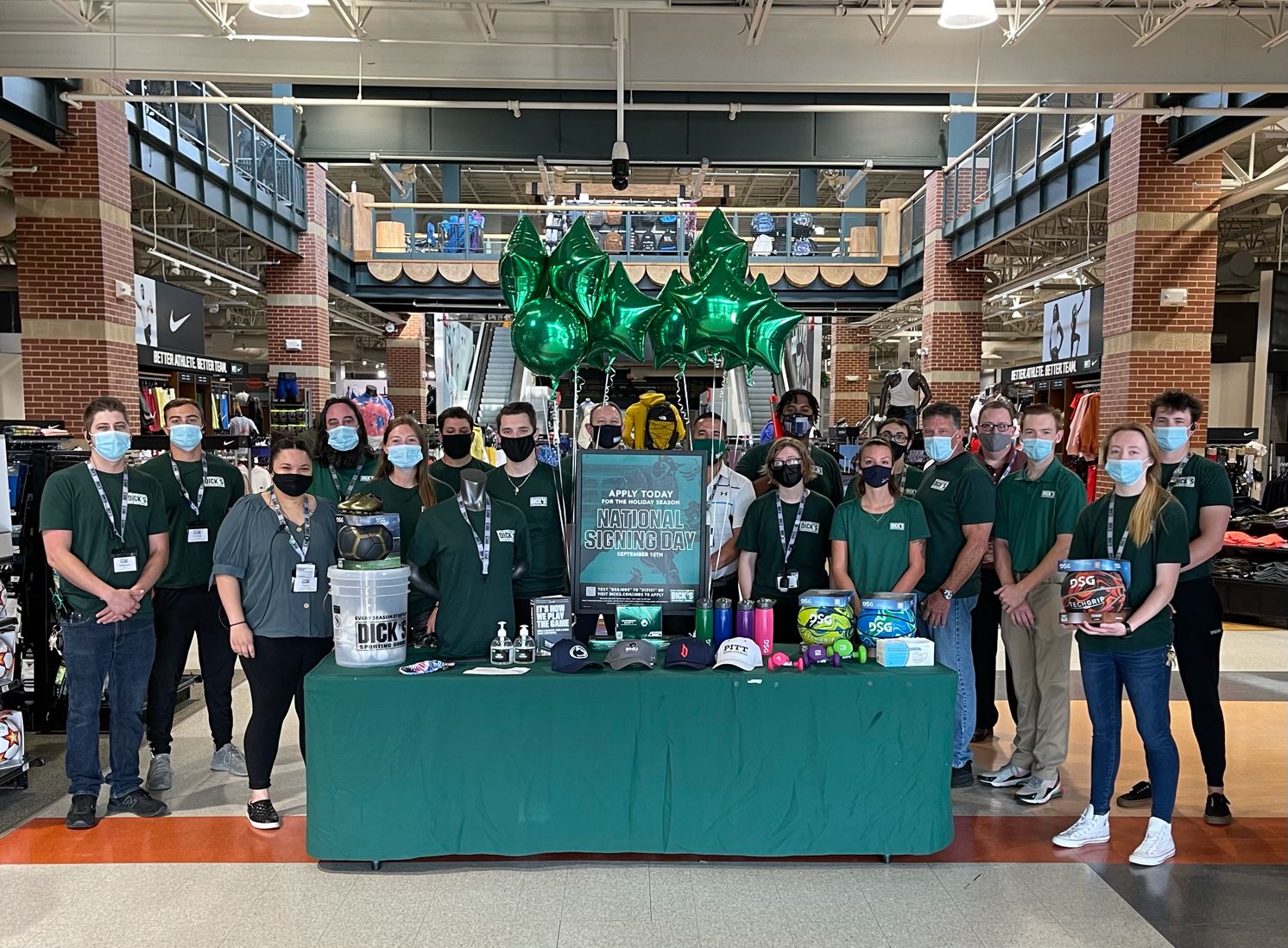Employee Engagement, Employee Experience, Employee Well-being
“I’m a huge proponent of work-life balance. We shouldn't have to be constantly switched on all day. It's not appropriate.”
You’d be hard pressed to find a company that’s more international than DHL Express, No. 1 on the World’s Best Workplaces™ list for two years running.
On this episode of the Better podcast, we learn what it takes to engage 110,000 employees dispersed in nearly every country in the world — 70% of whom are on the frontline.
Rick Jackson, executive vice president of engagement and enablement at Deutsche Post DHL Group, shares how gamification helps engage workers, how to tie purpose to every employee, the three questions he asks himself every day, and what he tries to avoid at all costs when communicating with his team.
On engaging frontline workers
If you want to engage the frontline, speak to them in their language. That isn't just about what words we use, it's also about the language that they speak in.
We make a point of translating everything for the frontline. Everything we do — whether it's cultural development, skills development, leadership behaviors, onboarding or engagement — gets translated into 42 languages so that they get it in their own language and they understand that it's relevant for them.
The second piece is around the identity of what it means and how you connect that group to something. And what we've done is try to gamify the whole situation.
On tying purpose to every frontline worker
If you're in a warehouse and it may be in the middle of the night, and it's cold and wet and you're sorting the parcels around the network, you understand that if you don't do your particular role, you're part of a much bigger cog in the organization that, at the end of the day, is improving the lives of the customer.
You're not just a picker or a packer. You're not just a warehouse site worker, but you're crucial in the supply chain. If you remind people of that, educate people about that and you constantly reinforce it, then they're engaged in the organization. They feel that they belong. They feel they've got a purpose themselves.
On the three questions he asks himself everyday
I’m reading a book called “Why Has Nobody Told Me This Before?” by Dr. Julie Smith and it's really around how to think, how to get rid of stress, what is a low mood, and how do you deal with it.
I'm not a negative person. I always look at the bright side of life, but that's why this book is so important because you don't have to be going through a depressive time to go through therapy to learn lessons.
I have a note on my phone and ask myself three questions. I don’t do it every day, but I look at them regularly.
-
At the beginning of the day, I ask: What are the two or three things that I'm going to do today that aim toward my goal or goals?
-
At the end of the day, I ask: Did I do those things and why or why not?
-
And, what are two or three things that I'm grateful for? What gratitude do I have for things that have happened today? .
On creating work-life balance
I’m a huge proponent of work-life balance. We shouldn't have to be constantly switched on all day. It's not appropriate.
I tell my team that I don't want anybody to tell me that they don't have a work-life balance because of what we’re doing on our team. And if it's coming to that point, you need to highlight it.
The other thing is that I always try to never, ever send an email after midday on a Friday until Monday morning.
Listen to all episodes
Subscribe to Better wherever podcasts are available so you don't miss an episode of season three.
Roula Amire:
Welcome to Better by Great Place To Work, the global authority on workplace culture. I'm your host, Roula Amire, Content Director at Great Place To Work. On this episode, we speak with Rick Jackson, EVP Engagement and Enablement at Deutsche Post DHL Group. We are very happy to have you here.
Rick Jackson:
It's nice to be here. Thank you very much.
Roula Amire:
You're not only one of the hundred best companies to work for in the U.S. You are world's best.
Rick Jackson:
I know.
Roula Amire:
Number one. Congratulations.
Rick Jackson:
Second year in a row. Amazing.
Roula Amire:
Yes. Yeah. How does it make you feel?
Rick Jackson:
Amazing. It just makes me feel so, so happy because it just shows the company that we've got and the people in it that really qualify it, and that's it really. So just we couldn't be happier, really couldn't be happier.
Roula Amire:
Yeah. What would you say to leaders who say hourly and frontline workers are hard to engage just in general?
Rick Jackson:
It's a really tough question because I don't think they are. And I haven't had the experience to say, are they hard or it's been hard, if I'm honest. But then I suppose I could also say that I'm not in the operational side on that front line to engage them. But what we are doing is we are engaging them from the group level into the business. If we want to really engage the frontline, we need to speak to them in their language. Now that isn't just about what words we use, it's also about the language that they speak in. So we have to go into our population, if we want to engage our front line with anything we do, we make a point of translating anything into that front line.
And we can get to 95% of our 110,000 people with around 42 languages. So everything we do, doesn't matter what it is, whether it's the cultural development, whether it's the skills development, whether it's anything to do with leadership behaviors or onboarding and engagement, gets translated into 42 languages so that they get it in their own language and they understand that it's relevant for them. And it's an easy thing because people can sometimes forget that. So that's-
Roula Amire:
Very achievable.
It's a very achievable thing. I think the second piece and is around the identity of what it means and how do you connect that group to something. And what we've done is we've tried to sort of, let's say gamify the whole situation. Everyone understands the game. And when we were doing the focus session in the position around our certified program, [inaudible] HR Director globally was talking about how there's this whole gamification element that comes with human beings of collection of stickers and stamps and-
Roula Amire:
Talk about the passports.
Rick Jackson:
Collections, the passport. So what we did was we created a passport to success in our organization where every single person, whether you're the CEO or you are a courier, or you're a customer service agent, or a salesperson or an IT or HR or finance, any person in our operation, you get given a passport. And as you go through your journey within the company-
Roula Amire:
And it looks just like a passport, it's we're talking about a passport.
Rick Jackson:
It's identical. In fact, I can give you a funny story of this, because when we first created the passport in 2010, we came up with the idea of it and we said, "Well, let's make it real. Let's make a real passport."
Roula Amire:
It looked like a real passport.
Rick Jackson:
Well, so we went to the company in the UK that makes the British passports, and the cover is the same cover that we use on passports. And the UK as a country ran out of passport paper when DHL placed their order because we needed to order over a hundred thousand of them-
Roula Amire:
Oh my goodness.
Rick Jackson:
At once. So we basically stripped the whole of the UK country of passport covers because we wanted them for our passports.
Roula Amire:
Because you just put in the order of a hundred thousand please.
Rick Jackson:
And we printed them all in one place in London. Anyway, that's just a sideline story, but the whole premise of that is it allow... Everybody has one. So as you go through your journey, you're collecting stamps of completion, you're collecting awards of recognition within it. You've got managers of our groups and countries signing it and leaving nice messages once they've finished a program to show how much they've achieved. That creates some form of gamification. It allows people to have an identity, and it allows everybody to have the same thing.
So you can compare, you can show people your passport, I could show you mine now it's in my bag, all the different stamps and stickers, and we carry them around with us. So when I go to a facility and I could go to work with couriers and I could go on a courier run and I could say to him, "Oh, show me your passport. I'll show you mine." Then we can compare our stamps and what we've got, and it immediately makes a connection to the person on the front line.
Roula Amire:
Yeah.
Rick Jackson:
So I sometimes-
Roula Amire:
There's no better icebreaker than that.
Rick Jackson:
There isn't. And this is where the connection element, for me, it's the comfortability and the connection of that which breaks all barriers and all boundaries. And for me, that's real true connection and engagement with our frontline. And that goes in their own environment, but with anyone who visits, with anyone who works with them, if they meet anybody around the world who works for DHL as well, they have a common discussion point, the passport.
Roula Amire:
And do they always pull out the passport? I mean, is that a usual common-
Rick Jackson:
You could, we could challenge anybody actually, anybody who, if they see a DHL Express Courier, could ask them about their certified international specialist program in their country and ask them if they've got their passport with them. Many countries, they carry them around with them in their pockets in their uniform, the couriers. In some countries they don't because they keep them safe within their environment. But we try and encourage as many of them to keep them with them. So if anyone asks, then you can show your passport to anyone. And yeah, I'll challenge anybody to go out and ask them. If they haven't got their passport, ask them about the program, ask them about what they do, but make sure it's a DHL Express Courier with the CIS logo on their courier shirt, and then you can-
Roula Amire:
They'll have it.
Rick Jackson:
Yeah.
Roula Amire:
Did you hear the story about the colleague who lost his backpack somewhere and he was most upset about his passport being lost?
Rick Jackson:
Yeah. Well, it was one of our senior executives actually who had his bag stolen, actually.
Roula Amire:
Stolen.
Rick Jackson:
Stolen. And in it was his normal passport, his wallet, his laptop, it's like your life. Sometimes I think to myself, how stupid could we possibly be to carry everything around with us? But we have to, it's the nature of what we do. But the most thing that he was upset about was he lost his certified passport, his international specialist passport. Because in it, is his memories, his stamps, his comments from senior executives who some have left the business now, and you'd never get your comments back. And it becomes your sort of memento.
Roula Amire:
I think this is a great example because I'm going to make an assumption here and say many leaders might assume if we're engaging workers, hourly workers, frontline workers, they may think typically it's from manager to employee, boss to employee, which of course there's a large place for that in terms of employee engagement. But you're talking about connecting employee to employee.
Rick Jackson:
Yeah.
Roula Amire:
No matter the level, who's managing whom.
Rick Jackson:
Yes.
Roula Amire:
That's all out the window. So it's connecting your workforce, which results in an engaged workforce.
Rick Jackson:
Yes.
Roula Amire:
Versus many employee engagement programs are, how can a manager connect with an employee?
Rick Jackson:
And it depends on what level of the program you talk about really, to be fair. So we have many leadership programs where the leader will be facilitating the group, and that generally will be the leader of the people within the group or one of the leaders, let's say, of the people within the group. So there is that connection.
Roula Amire:
That's a place.
Rick Jackson:
That's in the leadership place. But when we start to talk about the engagement side, so if we start think about our onboarding, I'll just use that as an example. We have a sort of foundation program onboarding into the hearts and minds of our business. You sit for a day and a half, you get facilitated through what our company's all about, what are our products, what's our network, how big are we in the world, what's important to us, what are our values, how we want you to react, and how we want you to behave and what it means to us in the organization, how we change the world, how do we connect people and improve lives, which is our purpose, and all the good we do. And it really grabs the emotional element. We want to get to the heart of the people in the business. When you look at that, that's where we have our colleagues facilitating people within the business.
Roula Amire:
So that's the part I think gets overlooked-
Rick Jackson:
Right.
Roula Amire:
At several companies. It's usually leadership. Leadership communication only.
Rick Jackson:
And maybe in some instances it will be leaders, but actually it's more about tenure. So what we want to do is if we've got new people coming into our organization, we'd love people who've been in the organization for a number of years who have a passion for using their experience, talking about their experience to stand in front of the group, and we'll give them an opportunity to facilitate. We'll build them up, skill them to facilitate, to help them through that process. And it's not the easiest thing in the world. And then no one's perfect at this, but it really helps that connection with colleagues in the business.
And it's not just leaders standing up in front of it. We're all in the room together. And actually within that room, if they're new and they're being onboarded into the business, it could be many different levels of seniority altogether because they're all being onboarded into the company. And it's not about what leadership is, it's about the values and the culture of our organization. And that doesn't change based on hierarchy.
Roula Amire:
Right. Based on your title. So that touched on purpose, connecting purpose.
Rick Jackson:
As it's connecting people, improving lives. Yeah. It's a big thing for us.
Roula Amire:
Yeah, that's your company.
Rick Jackson:
And it could have been more relevant to be fair in the last few years because when you look at our business, and connecting people, improving lives is not just a DHL Express purpose. Just so we're clear on that. Connecting people, improving lives is the purpose of Deutsche Post DHL Group. So all our businesses, whether it's Deutsche Post as the German Post, whether it's the DHL Express organization, the supply chain organization, our global fold in our freight business, our eCommerce business, or even our global business services, our back office functions, everybody has the same purpose. The company's built around connecting people, improving lives. And if you think about... The best example is the last few years, I mean, you just need to think about what's happened during the pandemic. We as an organization didn't stop.
If we were in an office base, which is 30% of our Express business, I'll just talk about Express just as one business, 30% of the business work in an office or in a customer service center. However, they go home overnight. But actually the majority of our population, their jobs didn't change. Their jobs just got harder because we needed everybody to be working. We had to use our bank of engagement we've built over the years to help them through it. We had to protect them. We needed them to have a safe environment that they needed to work in. Because what happened, everybody started to buy online. So the volume that was going through the network and the way the world was locking down and opening up and moving around, and the way that our network was agile enough to shift, it meant the business literally exploded.
So it wasn't just the fact that we had normal volumes with this challenge. We had extended volumes, we're at record volumes with the same challenge, but everybody rallied around the same purpose that we were actually connecting people and improving their lives because that's what we were actually doing with them, because everyone was at home and they needed to buy, and they bought everything online. Because actually, if we can say you may be a courier delivering, then you can see your massive impact because you're delivering things to people. So you know you're connecting people and you're improving their lives because you're delivering every day.
If you're in a warehouse and you're in the sort, and you may be in the middle of the night and it's cold and it's wet and you've still got PPE on and you're sorting the parcels around the network, or you're doing pick and pack in one of the supply chain warehouses, you understand that if you don't do your particular role... You're part of a much bigger cog in the organization that really is at the end improving the lives of the customer and ensuring that we're connecting people, improving lives, then we understand what your role does. You're not just a pick Aurora packer. You're not just a warehouse site worker. You're crucial in the supply chain to make sure-
Roula Amire:
And you make sure those warehouse workers that.
Rick Jackson:
That's it. We are connecting people and we're improving their lives, and they're part of that.
Roula Amire:
Yeah.
Rick Jackson:
And if you remind people of that and you educate people of that and you constantly reinforce it, then they're engaged in the organization. They feel that they belong. They feel they've got a purpose themselves.
Roula Amire:
What's one way you enforce and remind those workers of that?
Rick Jackson:
Through communication. Through ensuring that whoever's communicating through in their facility, in their environment, in their country, talks about the stories, highlights, stories of good, highlights employees that are doing a fantastic job, relating it back to our values, relating it back to our purpose. People understand it and they get it. And it's total reinforcement as well as reward, actually. Because just by talking about these things, there's a certain sense of pride that comes with that. And we just want people to walk off from our organization feeling proud to work for the company, and ensuring that their families are proud that they work for the company. Then we've got the golden ticket, and it's not by accident, if I'm honest. And I can be so brazen to say we've gone up the ranks to be the best company in the world to work for because there's so much that contributes to that. I just long hope it continues and we can build and strengthen that over the course of the next few years.
Roula Amire:
You've been through a global pandemic and operated in nearly every country, and you're the world's best. I think you can continue.
Rick Jackson:
We've not done too bad.
Roula Amire:
Exactly.
Let's switch gears a bit and get to know you a little bit more.
Rick Jackson:
Okay.
Roula Amire:
So you've been in HR for most of your career.
Rick Jackson:
No.
Roula Amire:
You have not?
Rick Jackson:
No, I'm not an HR history. I'm not an HR professional by trade. I'm an IT guy.
Roula Amire:
You're an IT guy.
Rick Jackson:
Not many people know that. Yeah.
Roula Amire:
How did you get here?
Rick Jackson:
Well, I'm an IT and a mathematician, so-
Roula Amire:
Oh dear.
Rick Jackson:
My degree was a dual honors in computer science programming and applied in pure mathematics. I don't know, I know I can see you looking at me. I don't know, however that was, but that was my history.
Roula Amire:
So I'm curious to hear your answer then to this question. What advice would you give yourself, would you go back and give yourself before you entered the workforce, which is in IT. Everyone else I've spoken with, of course, is in the HR space, so I'm curious.
Rick Jackson:
You know...
Roula Amire:
Maybe it transcends.
Rick Jackson:
Yeah, and I don't think I'd... Well, if I had to go back and say something, I think I'd just turn around and say, "Carry on what you're doing. This is going to be the ride of your life. Just get ready for it. But I'm not going to tell you anything about it because you may want to try and change a few things." And I think that's what I'd say. But just carry on, you'll be absolutely fine, because I love what I'm doing. I know I'm in my sweet spot now. I'm really passionate about it.
Roula Amire:
Yeah. And all those decisions you made along the way of course got you here.
Rick Jackson:
And to be fair, one thing that I always think to myself is my IT and my mathematics background taught me to think in a certain way. And I can't really quantify this, but I really do believe that the way I think now in my role today based on computer science and mathematics, really gives me a different way of looking at things than many other people that I know or I've met before. And it compliments that other thinking. So it makes it much better from a team perspective with everybody to be working together with them. So I don't think I'd go back and say anything. I'd just say, "Look, you'll have the ride of your life. So just carry on, keep your head down, work hard, and play hard." And which is what I've done for the last 20 years. So I can't really complain about that.
Roula Amire:
I saw you brought a book in with you.
Rick Jackson:
Yes. I'm reading a book at the moment.
Roula Amire:
What are you reading and why should we also read it?
Rick Jackson:
Right? Well, this is a really interesting book. The book is called Why Has Nobody Told Me This Before? And it's a book by a lady called Dr. Julie Smith. And if I recall why I bought... This is the second time I've read this book, if I'm honest. And I was sorting through my office a couple of weeks ago and I found the book again, and I thought, "You know what? I'm going to read this again." And it's... Dr. Julie Smith is a therapist, and she takes lessons from therapy that she does with her clients, but actually it's more life skill, not necessarily designed for a certain therapeutic method. And she's taken those life skill and really contextualized and understood them and makes it easier for a layman who's not a therapist to really understand how you can be. And it was... I remember reading it the first time and a lot of the messages-
Roula Amire:
How long ago did you read it?
Rick Jackson:
Oh, not that long. Not that long. It's only probably two years or 18 months. And so I've just picked it up again, and I started to read it actually on the plane on the way over. I'm about 50 pages into it, but I'll probably finish it in the next couple of weeks again. But it's starting to flood back some of the messaging. And it's really around how to think, how to be chilled, how to get rid of stress, what is a low mood, and how do you deal with it? It's really, really interesting. And I love that type of stuff because I'm not a negative person. I'm very, very lucky. I always looked at the bright side of life and everything. I find enjoyment in everything. And I'm not overly happy, don't get me wrong, but-
Roula Amire:
You're grateful.
Rick Jackson:
Yeah. And I'm not a pessimistic person in any way, and I'm just happy with life.
Roula Amire:
What's something that's percolating from the book that you're reading?
Rick Jackson:
No, it's just more about how to manage stress or how to manage your mind if you get negative thoughts, if you're in a low mood, how to manage and deal with that and how to look at that.
Roula Amire:
Which we all have.
Rick Jackson:
And we all get it. Everyone gets it, and that's why-
Roula Amire:
Exactly. Even the most optimistic, grateful person.
Rick Jackson:
And that's it. And I think that's why this book's so important, because you don't have to be going through a depressive time to go through therapy to learn the lessons from that. It's a really... On reflection when you really sit and think about it, it's really an important piece. In fact, I'll share something with you because when I read the book the first time, I wrote down three things, and I have a note on my phone that I ask myself questions. And I don't do it every day.
Roula Amire:
I was going to ask, are you supposed to?
Rick Jackson:
Exactly.
Roula Amire:
Is the idea every morning?
Rick Jackson:
I think the idea is that you do it every day. But don't get me wrong. I mean, you know...
Roula Amire:
Yeah, you're a busy guy.
Rick Jackson:
Yeah. And it's not a habit, but I do look at it regularly. I'd say maybe twice a week, two or three times a week.
Roula Amire:
Putting it on your phone is a good idea.
Rick Jackson:
Yeah, exactly.
Roula Amire:
Because then you can pull it up.
Rick Jackson:
And I'm always up looking at notes on my phone for different things. And when I find it, I do sit down and think about it. And if I get five or 10 minutes, I do think. But I always ask, at the beginning of the day, I ask myself, "What are the two or three things that I'm really going to do today, small things that aim towards my goal or my goals?" Whether it's personal goals or work goals.
Roula Amire:
Any goals.
Rick Jackson:
Any goals.
Roula Amire:
Life.
Rick Jackson:
Yeah. But then at the end of the day, I spend some time to reflect on it, and did I do those two or three things or not, and why? But also the biggest thing is I ask myself, and this is a really interesting question, "What are two or three things that I'm grateful for? What gratitude do I have or thankful for things that have happened today?" Again, it can be tiny things, but it just puts life into perspective sometimes. And I just sit and think, "You know what? Life's good actually." And that doesn't mean to say that bad things don't happen.
Roula Amire:
But you can find the good.
Rick Jackson:
You can find some things that can motivate you. Even if you've had the worst day and you're in the lowest mood, you can still find the odd things that can really motivate you. So that's what that book gave me, and that's what I asked. I have it on my phone as a note, so that's what I'm reading.
Roula Amire:
Was there a third question? Did you say there three question you ask yourself?
Rick Jackson:
No that was it. So the one was the two or three things towards my goals. The second one was, have I done them?
Roula Amire:
Oh, and then the third is what are you grateful for.
Rick Jackson:
The third one is the thankful, the gratitude. Yeah. Yeah.
Roula Amire:
I like that.
Rick Jackson:
Yeah.
Roula Amire:
Yeah. This is along the same lines of mental health and wellbeing, and you've touched on it. Actually, this is probably your answer on how do you create a sense of wellness for yourself day in and day out? Is it asking these questions, taking time for yourself?
Rick Jackson:
Yes, but I am a huge, huge proponent of work-life balance. Okay, don't get me wrong. I'm away now. I'm in the US and I travel a lot for work, so I'm not always at home, but I'm a huge believer in work-life balance. And when I say that, what do I mean? What I mean is we shouldn't have to be constantly switched on all day. It's not appropriate. And I tell all my team this, all of them, all the way down the organization, I do not want anybody to come to me and tell me that they don't have a work-life balance because of what we are doing in our team. And if it's coming to that point, you need to highlight it. Now, don't get me wrong, that doesn't mean to say that one day in the next four weeks, you have to work two or three hours more extended than what you ever thought you would, and all of a sudden it's a big issue.
Because we do have to work and we do have to apply ourselves. And if you want to go further in the world and you want a huge career, you do have to do things like that every now and again. But it shouldn't be constant. You have to have a life. It's not the norm. You have to have a life. And it's small things that can help with that. So if I'm away, then I don't work because I'm away from home from eight in the morning until 8:00 PM, 9:00 PM at night. I finish at five, and maybe I'll go to a dinner with colleagues from work. And I don't necessarily class that as work in many ways, but I might also say, "Okay, I'm finishing at five. I'm in Singapore. I'm going to go for a walk around the lake. I'm going to go to the Marina Bay Sands and go and have a putter round and go for a coffee. I'm going to go and get a massage in the hotel."
I make sure I make time for myself and really stop for five minutes and think, "I'm going to have the balance here, even though I'm away." So that's one thing I do. The other thing, which I find super important, is... My team may disagree with me here, but I always try never, ever to send an email after midday on a Friday until Monday morning.
Roula Amire:
Oh, after midday.
Rick Jackson:
After midday on a Friday until Monday morning. I try my best not to send an email because as soon as I send an email, the knock on effect of me sending one email, which I genuinely might think is nothing, and it's more selfish of me to get it out of my mind to someone else-
Roula Amire:
Before the weekend hits.
Rick Jackson:
It creates a knock-on chain effect. And all of a sudden, at 4:00 PM on a Friday afternoon, you've got five people doing things that are just supposed to be finishing off the end of their week because they're worried because I've asked a question at 2:00 PM. So I do my best constantly to never send an email after midday on a Friday. I'm definitely, definitely not over a weekend.
Roula Amire:
Ever.
Rick Jackson:
No. Well, every now and again-
Roula Amire:
Did that hold true during the pandemic?
Rick Jackson:
Yeah. Yeah. Yes. Because for me, it was about my team ensuring they were with their families and looking after where they are at home. But I think one of the things for me actually with this is every now and again, I do send the odd thing, and no one's perfect. That's my rule. It's my own rule. But what that doesn't mean is that I don't do work. Because if I find I'm comfortable because I have an hour on a Sunday afternoon where I'm set on my own, and I'd like to prepare myself for the week ahead so I don't get a little stressed on a Sunday night before I go to bed. And I think to myself, I'm just going to go through my emails, then I do. But what I do is I run through my emails, I reply and I save everything to the draft, and then my inbox is empty.
I've answered what I need to answer. I wake up on Monday morning, the first thing I do is go into my draft folder and I send all my emails. So no one's received anything before Monday when they get back into the office. So I'm a huge believer in that. I take to my team, don't do it. Please don't do it. Because I also don't want to receive an email on a Saturday or a Sunday, because I'll read it if it comes in. Because you all know what happens. You've got your phone, you're looking at, I don't know, Instagram, Facebook, LinkedIn, Twitter, and it goes, "beep, beep" and you go, "Oh, I've got an email." You don't leave it.
The first thing you do is look at it. No one's going to leave it. So I say to people, "Please don't send me an email." It's not... I don't like it.
Roula Amire:
Right.
Rick Jackson:
And I say it to my boss as well. If you go and asks Thomas, who's the board member for HR for Deutche Post.
Roula Amire:
Yeah.
Rick Jackson:
I say to him as well, "Please don't send me an email on a Friday night, because soon as you send it, I'm now distracted for two days."
Roula Amire:
Yeah.
Rick Jackson:
So yeah.
Roula Amire:
You practice what you preach.
Rick Jackson:
Exactly. It's a work in progress with everyone, but that's what I like to do. To keep my wellness, to keep my balance. Yeah.
Roula Amire:
Rick, thanks for joining us today.
Rick Jackson:
No, it was fine.
Roula Amire:
It was an absolute pleasure.
Rick Jackson:
It's been a pleasure for me, I really enjoyed it. Thank you.
Roula Amire:
I enjoyed the conversation.
Rick Jackson:
Yeah. Excellent. Thank you.
Roula Amire:
Thank you.
Thank you for listening to this episode of Better. You can stream this and previous episodes wherever podcasts are available.


